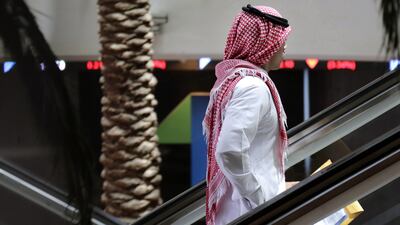Mena markets have managed to retain recent gains, after having rallied about 14 per cent from the low point of the year.
We still see decent value in Mena markets, which currently trade at a price to earnings (trailing 12 months) multiple of 12.3 times compared with a historical five-year average of 14.8 times. However, first-quarter growth has been soft and is likely to be reflected in company earnings.
Petchem earnings are likely to be affected by an increase in feedstock cost in Saudi Arabia, and the banking sector is likely to be impacted by lower margins on the back of tighter liquidity in the system and declining fee income because of a decrease in economic activity. Both are heavyweight sectors.
An important event for the GCC region has been the approval of 133 proposals in Saudi Arabia as part of the National Transformation Plan (NTP) 2020. The NTP has been a much- awaited policy document in the kingdom after it was first mentioned by the kingdom’s deputy crown prince in a media interview earlier this year.
Regional investors are usually circumspect about such plans, as they seek to cut through the traditional way of functioning and have the potential to disturb the social accord that exists in Saudi Arabia, but in this instance the far-reaching nature and economic impact of the reforms cannot be ignored.
The basic aim of the plan is to eradicate inefficiencies and make it easier for businesses to increase latent potential. While debating the ultimate effectiveness of NTP is futile at this stage, the likely implications if delivered well could be far-reaching for Saudi Arabia. In our opinion, the NTP would be growth accretive but margin dilutive for the Saudi Arabian corporate sector.
The NTP will affect many sectors as the spending burden is removed from government financials. The plan could also include a list of state assets to be privatised through public-private partnerships or an outright sale. Sectors that are likely to experience a negative impact include industrials on a probable announcement of a timeline for subsidy removals, and retail as it bears a disproportionate burden of an elevated Saudisation programme.
At a macro level, the plan is expected to shape expectations about fiscal spending behaviour in Saudi Arabia that has historically overshot budgeted spending by a wide margin. But more on this when further details are released.
Meanwhile, oil has held on to recent gains. US inventories reached an all-time high of 532.5 million barrels, whereas US production of crude oil has reduced by 197,000 barrels per day from its 2016 peak in mid-January.
Brent gained 8.5 per cent last week, closing at US$41.9 per barrel, and indeed there are now some commentators focusing on the medium-term ramifications of the lack of exploration and drilling that is being conducted at present.
On a year-to-date basis, the oil price has increased by 12.5 per cent, partially aided by the about 4 per cent depreciation of the US dollar. US rig data shows that the US rig count is at 372 from a peak of 1,609 in October 2014.
All eyes are also on the upcoming meeting of Opec and other oil-producing countries in Doha on Sunday.
We do not expect production cut announcements as oil supply has already started to gradually curtail. It appears thus far that Opec’s strategy to disrupt high-cost marginal producers and expand their own production capacity through further exploration and drilling is working.
Mena markets have been subject to some profit-taking recently as investors looked to lock in gains ahead of the release of first-quarter results and exit positions post-dividend payments. Taking into account recent growth downgrades for the region and current dividend yields, we believe valuations remain attractive with the potential for significant capital appreciation over the longer term.
Saleem Khokhar is the head of fund management at National Bank of Abu Dhabi.
business@thenational.ae
Follow The National's Business section on Twitter

